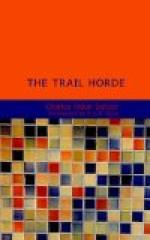At the close of the second day the big trail herd halted at the edge of the vast level over which it had come. The herd had been driven forty miles. Cattle, men, and horses had passed through a country which was familiar to them; a country featured by long grama grass, greasewood, and cactus plants.
There was no timber on the plains. The gray of the grama grass and the bare stretches of alkali shone white in the glare of a sun that swam in a cloudless sky of deepest azure. Except for the men, the cattle, the horses, and the two slow-moving, awkward-looking canvas-covered wagons, there had been no evidence of life on the great plain. In a silence unbroken save by the clashing of horns, the bleating and bawling of the cattle, the ceaseless creaking of the wagons, and the low voices of the men, the cavalcade moved eastward.
The wind that swept over the plains was chill. It carried a tang that penetrated; that caused the men, especially in the early morning, to turn up the collars of their woolen shirts as they rode; a chill that brought a profane protest from the tawny-haired giant who had disclosed to Lawler the whereabouts of Joe Hamlin that night in the Circle L bunkhouse.
The first camp had been made on the Wolf—at a shallow about five miles north of the Two Bar, Hamlin’s ranch. And with the clear, sparkling, icy water of the river on his face, and glistening beads of it on his colorless eyelashes, the giant had growled to several of his brother cowboys, who were likewise performing their ablutions at the river:
“This damn wind is worse’n a Kansas regular. You lean ag’in’ it an’ it freezes you; you turn your back to it an’ you’ve got to go to clawin’ icicles out of your back. Why in hell can’t they have a wind that’s got some sense to it?”
“It ain’t c-cold, Shorty,” jibed a slender puncher with a saturnine eye and a large, mobile mouth.
“Kells,” grinned the giant; “your voice is froze, right now!”
And yet the men enjoyed the cold air. It had a tonic effect upon them; they were energetic, eager, and always ravenously hungry. The cook offered testimony on that subject, unsolicited.
“I never seen a bunch of mavericks that gobbled more grub than this here outfit!” he stated on the second morning. “Or that swilled more coffee,” he added. “Seems like all they come on this drive for is to eat!”
Toward the close of the second day corrugations began to appear in the level. Little ridges and valleys broke the monotony of travel; rocks began to dot the earth; the gray grass disappeared, the barren stretches grew larger and more frequent, and the yucca and the lancelike octilla began to appear here and there. The trend of the trail had been upward all afternoon—gradual at first, hardly noticeable. But as the day drew to a close the cattle mounted a slope, progressing more slowly, and the horses hitched to the wagons began to strain in the harness.




